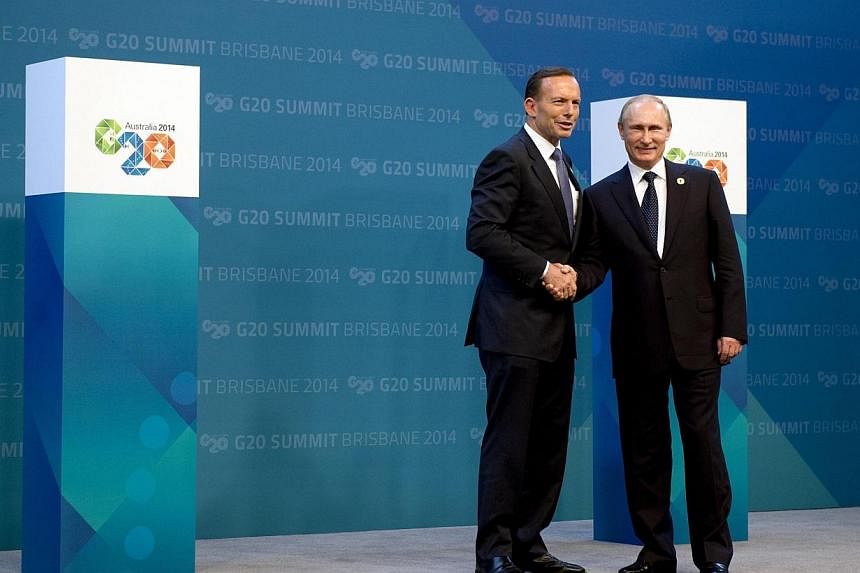BRISBANE, Australia (AFP) - Russian President Vladimir Putin is to walk out of a Group of 20 summit in Australia, an aide said on Saturday, after he faced scorn and scepticism from Western leaders over Ukraine despite venturing to paper over Europe's deepest chill in relations since the Cold War.
The abrupt decision threatens to upend the annual summit's focus on revamping the global economy and fixing sores such as the Ebola epidemic in west Africa. "The programme of the second day (for Mr Putin) is changing, it's being cut short," a source in the Russian delegation told AFP, on condition of anonymity.
Mr Putin will attend summit sessions on Sunday, but will skip an official lunch and address reporters earlier than planned, the source said, adding: "Lunch is more of an entertainment."
The source denied that Mr Putin was bowing out under pressure from top Western leaders, who accused him of "bullying" ex-Soviet Ukraine. "There were no scandals," the source said.
A Kremlin spokesman said earlier on Russian radio: "The G-20 summit will be over tomorrow, Mr Putin will certainly leave it, when all the work is completed the president will leave."
He denied that pressure from Western leaders, who have threatened Russia with more sanctions if fighting in eastern Ukraine intensifies, forced Putin to change plans.
"Sanctions are being actively and broadly discussed at all bilateral meetings but no one is putting pressure," Mr Peskov said.
"This is complete nonsense," he told Russian reporters separately. "This is a usual, routine situation."
There was no immediate comment from the G-20's Australian hosts or other delegations such as United States President Barack Obama's to Mr Putin's decision, which came after some testy exchanges in Brisbane on Saturday.
Canadian Prime Minister Stephen Harper was approached by Mr Putin to shake hands. Mr Harper said, according to Canadian media: "Well, I guess I'll shake your hand, but I only have one thing to say to you: you need to get out of Ukraine."
Before his own tense meeting with Mr Putin on the G-20 sidelines, British Prime Minister David Cameron said Russia faced a choice, with one option to implement an agreement to allow stability to return to Ukraine free of Moscow's meddling.
"It's important to warn of the dangers if Russia continues to head in the other direction," Mr Cameron said, bluntly warning that Mr Putin had failed to serve Russia's own interests by exposing it to punishing Western sanctions.
"If that path continues and if that destabilisation gets worse, the rest of the world, Europe, America, Britain, will have no choice but to take further action in terms of sanctions," he said.
G-20 host Tony Abbott went into a week of Asia-Pacific summitry vowing to confront Mr Putin, particularly over the downing of a Malaysia Airlines passenger jet over Ukraine in July.
In the event, on Saturday, the Australian Prime Minister was all smiles as he posed for a handshake with a similarly grinning Mr Putin - before the two leaders were photographed holding koala bears together.
However, the koala diplomacy was followed by less cuddly formal talks on the G-20 sidelines between Mr Putin and Western leaders, including Mr Cameron and French President Francois Hollande.
Beyond the Ukraine issue, Russia is at odds with France over a long-delayed deal to transfer two French warships to the Russian navy.
But the deal was not raised by Mr Putin in his separate bilateral meeting with Mr Hollande, a French source said, and the two leaders appeared at pains to talk about potential for finding common ground before news of Mr Putin's bombshell departure emerged.
Meanwhile, Ukraine's President Petro Poroshenko on Saturday issued a decree ordering the withdrawal of all state services from the rebel-held east of the country. The order covers services such as schools, hospitals and emergency services, a senior security official speaking on condition of anonymity told AFP.
Mr Poroshenko ordered his Cabinet to take steps within a week "to terminate the activities of state enterprises, institutions and organisations in the various territories where anti-terrorist operations are being conducted," the decree said.
"This is a decisive step, the games have stopped," the official added. "All the structures that the state finances will be withdrawn from there.
"Ukraine will no longer finance them. This includes schools, kindergartens and hospitals."
Seven months of fighting between Ukrainian forces and pro-Moscow separatists with strongholds in eastern Ukrainian cities such as Donetsk and Lugansk have killed over 4,100 people, the United Nations says.
The move comes with the unrest in Ukraine high on the agenda at a G-20 Summit, where the pressure on Mr Putin was piled on.
Russia denies involvement in the conflict, in which a shaky ceasefire agreed in September is in place, stopping some frontline fighting but not artillery bombardments around strategic hotspots.

